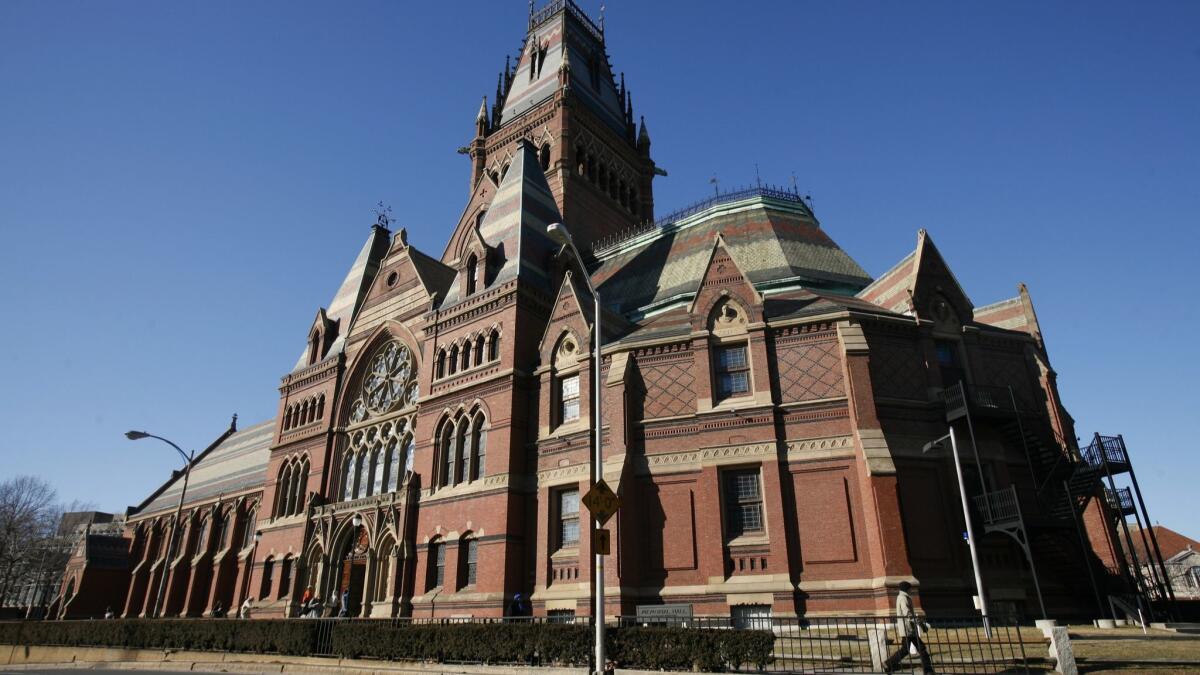Op-Ed: Asian Americans think an elite college degree will shelter them from discrimination. It won’t

- Share via
College admissions season is here. In the coming weeks, millions of high school seniors will receive letters of acceptance or rejection. They will then have a few more weeks to choose which school to attend.
The college admissions process produces anxiety for many students and parents, but the angst is particularly heightened among Asian American families. The reason: Asian Americans are more likely than other groups to believe that attending an elite university — and preferably an Ivy League one — is a necessary step to a successful career.
A growing body of research has established that Asian Americans tend to disproportionately value prestige when it comes to higher education. In general, Asian Americans would rather be a below-average student at a top 10 school than an above-average student at a top 100 school. Several psychological studies show that white students are more likely to prefer the opposite.
Our research has shown that Asian Americans often define success as being the high school valedictorian, attending an elite university and pursuing a career in medicine, law, science or engineering. And there is at least one clear reason for the emphasis on prestige: Elite credentials are seen as a safeguard against discrimination in the labor market.
The importance placed on prestige is partly why so many Asian American organizations have joined lawsuits against Harvard and other Ivy League universities for allegedly capping admissions of Asian American students. The groups have urged the Department of Education and Department of Justice to investigate the claims.
But there is also growing evidence that this faith in elite credentials may be misplaced.
According to a 2015 investigation by Business Insider, only one CEO of a top 10 Fortune 500 company had gotten their undergraduate degree from an Ivy League university. Only 30% of American-born CEOS of the top 100 companies attended an elite college.
There is at least one clear reason for the emphasis on prestige: Elite credentials are seen as a safeguard against discrimination in the labor market.
A recent report on leadership diversity at top technology companies found that Asian Americans are the racial group least likely to be promoted into managerial and executive ranks. White men and women are twice as likely as Asians to hold executive positions. And while white women are breaking through the glass ceiling, Asian women are not.
Asian Americans also fall behind in earnings. College-educated, U.S.-born Asian men earn 8% less than white men. Although Asian American women are likely to earn as much as white women, they are less likely to be in a management role.
There are at least two explanations for why Asian Americans are hitting a ceiling in their professional lives.
In numerous interviews with corporate leaders, we learned that Asian Americans are less likely to be seen as leadership material, and are thus given fewer opportunities to advance and succeed. Part of this is based on stereotype. Asians are often viewed as smart, diligent, focused, quiet and technically competent — traits that make them desirable employees, but not desirable leaders. So strong are these stereotypes that even when Asian workers take creative risks, supervisors may still prefer to promote someone else.
But our research also indicates that Asian Americans are less likely than white and black Americans to engage in civic activity, which is strongly correlated with corporate leadership.
According to the Current Population Survey, 17.9% of Asian Americans engage in volunteerism, compared to 26.4% of whites and 19.3% of blacks. Our analysis of the 2016 National Asian American Survey shows that only 59% of Asian Americans make charitable contributions, compared to 68% of whites and 65% of blacks. This lack of engagement outside of work is handicapping Asian Americans in their careers.
As the corporate world works to address issues of bias, Asian Americans should consider that what people do in college and afterward is a stronger predictor of success than the status of the college they choose to attend. At the very least, this should help quell the anxiety of high school seniors awaiting admissions decisions from their first-choice schools.
Jennifer Lee (@JLeeSoc) is a professor of sociology at Columbia University. Karthick Ramakrishnan (@karthickr) is a professor of public policy at the UC Riverside. They are writing a book on redefining success in a racially diverse America.
Follow the Opinion section on Twitter @latimesopinion or Facebook
More to Read
A cure for the common opinion
Get thought-provoking perspectives with our weekly newsletter.
You may occasionally receive promotional content from the Los Angeles Times.










